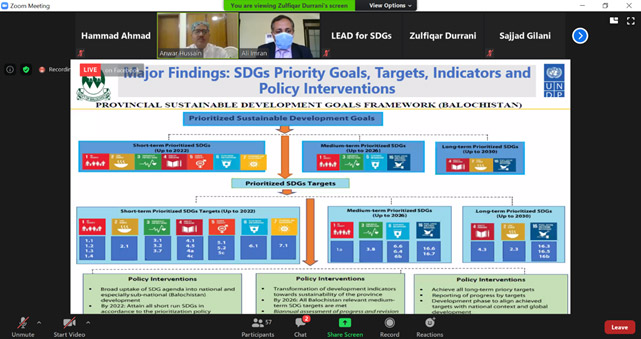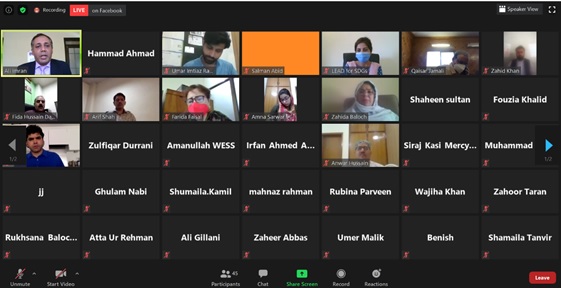7 July 2020 | ISLAMABAD – The LEAD for SDGs Programme in collaboration with Government of Balochistan, SDGs Units. Planning and Development Departments and UNDP sub-office Quetta organised a webinar on “SDGs Localisation: Provincial SDGs Frameworks and Role of Stakeholders in their implementation”, to share the progress made by provinces in developing the provincial SDGs frameworks and to highlight the roles of various stakeholders including local governments, civil society, private sector, academia and media in its implementation.
Pakistan is amongst very few countries which conducted survey to understand and know development priorities at the time when SDGs were being formed. In this process the local governments, civil society and other stakeholders were involved in developing its indicators. Pakistan was the first in the Asia Pacific region who adopted the SDGs as National Development Goals through a unanimous resolution by the Parliament of Pakistan in 2015. It is important now to translate the global indicators into local achievable indicators.
Mr. Arif Hussain Shah, Chief of SDGs Section, Planning and Development Department, Government of Balochistan shared in his keynote address that the Chief Minister and Parliamentary Taskforce on the SDGs takes Agenda 2030 as one of the top priorities. While sharing progress on Balochistan Provincial SDGs Framework, he stated that the framework document highlighted data gaps as one of the major challenges in the province. Government of Balochistan is focusing to improve the capacity of statistical institutions to fill the gaps, generate data and measure progress. He said that Planning and Development Department Balochistan has also initiated districts SDGs development plans to develop two model SDG districts in the province as a pilot.
Mr. Zulfiqar Durrani, Provincial Representative, UNDP Sub-Office Quetta briefed about the key elements of Balochistan Provincial SDGs Framework. He shared the background, objectives, methodology, priorities, action plan for 2020-21 and the recommendations for effective implementation of SDGs at local level. He also highlighted the role of other key stakeholders including private sector, media, academia and civil society as key to succeed in the SDGs achievement. He added that Balochistan does not have elected local governments since January 2019, which is one of the challenges for inclusive development process. On data gap, he referred that “out of 175 provincial and district level indicators, data is readily available on 13 indicators and partially available on 14 indicators”.
Representatives of Provincial SDGs Support Units from Punjab, Sindh and Khyber Pakhtunkhwa Provinces and regions of Gilgit Baltistan and Azad Jammu and Kashmir also shared the progress on the development and priorities of Provincial SDGs Frameworks. In Punjab Province, SDGs priorities are integrated in all departments and development budgets are aligned with SDGs through an automated system. In the Sindh Province, SDGs thematic as well as cluster committees are formed and supervising the effective localisation of SDGs framework. Khyber Pakhtunkhwa Province has allocated 30% of the Annual Development Plan to the local governments for effective implementation of SDGs at district level. The province is also facing challenge of merger of Federally Administrative Tribal Areas into the province as well as fighting the health emergency arise as a result of COVID-19. Azad Jammu & Kashmir and Gilgit Baltistan states are in the finalisation of their SDGs Frameworks.
Ms Najma Perveen, Chief SDGs Unit Gilgit Baltistan Region said that the SDGs are more difficult to implement in extreme geographical areas as Gilgit and Baltistan is at highest altitude mountainous range with population density as low as 19 persons per square kilometre. However, it comes with opportunity where 92% population have agriculture land and 85% own their own homes. However, it is challenging to implement SDGs for scattered population, with allocation of only 15% development budget.
Mr. Nadeem Ahmed, Social Policy Advisor, Federal SDGs Support Unit, Ministry of Planning, Development and Special Initiatives, Pakistan shared the background of Pakistan National Framework on SDGs, its methodology and highlighted short, medium- and long-term priorities. He shared that policy coherence, ownership and political support and a systematic monitoring and evaluation process are keys for effective localisation of SDGs. He also shared that National Framework on SDGs worked as a guiding document for provinces to develop their own provincial and district development plans which provides clear roadmap for implementation and localisation of SDGs at district and union council levels.
At the end of the webinar, Mr. Rajan Sultan Pirzada, President of the Association for Development of Local Governance (ADLG)- a member association of UCLG ASPAC highlighted the key role of local governments in adopting and implementing SDGs. He said that the national, provincial and local governments need to work together with the private sector, civil society organisations and other relevant stakeholders to achieve SDGs targets. Control and minimisation of corruption is key to manage our resources well. We need to use media & technology in positive manner to achieve the targets.
The webinar was concluded with the following recommendations by the participants:
- Mainstream SDGs in local development agenda at provincial and local levels
- Need and importance of elected local governments for inclusive and participatory local development.
- Align provincial development plans and strategies with Global Agenda 2030
- Strengthen and improve data and reporting
- Improve capacities of the provinces to monitor and evaluate SDGs progress
- Align provincial finances with prioritised SDGS
- Government should facilitate public private partnership to implement SDGs
- SDGs should be integrated and aligned in legal and policy frameworks
The webinar was jointly hosted by the Government of Balochistan, UNDP Sub-Office Quetta and the LEAD for SDGs Programme through members ADLG, Local Council Association Sindh (LCAS) and Local Council Association Balochistan (LCAB), with the support of the Delegation of European Union in Pakistan. It was attended by more than 60 plus participants, representing various sectors including the local governments, Ministry and Departments of Planning and Development, federal and provincial SDGs Support Units, UN agencies, European Commission, media, corporate sector and civil society organisations.












